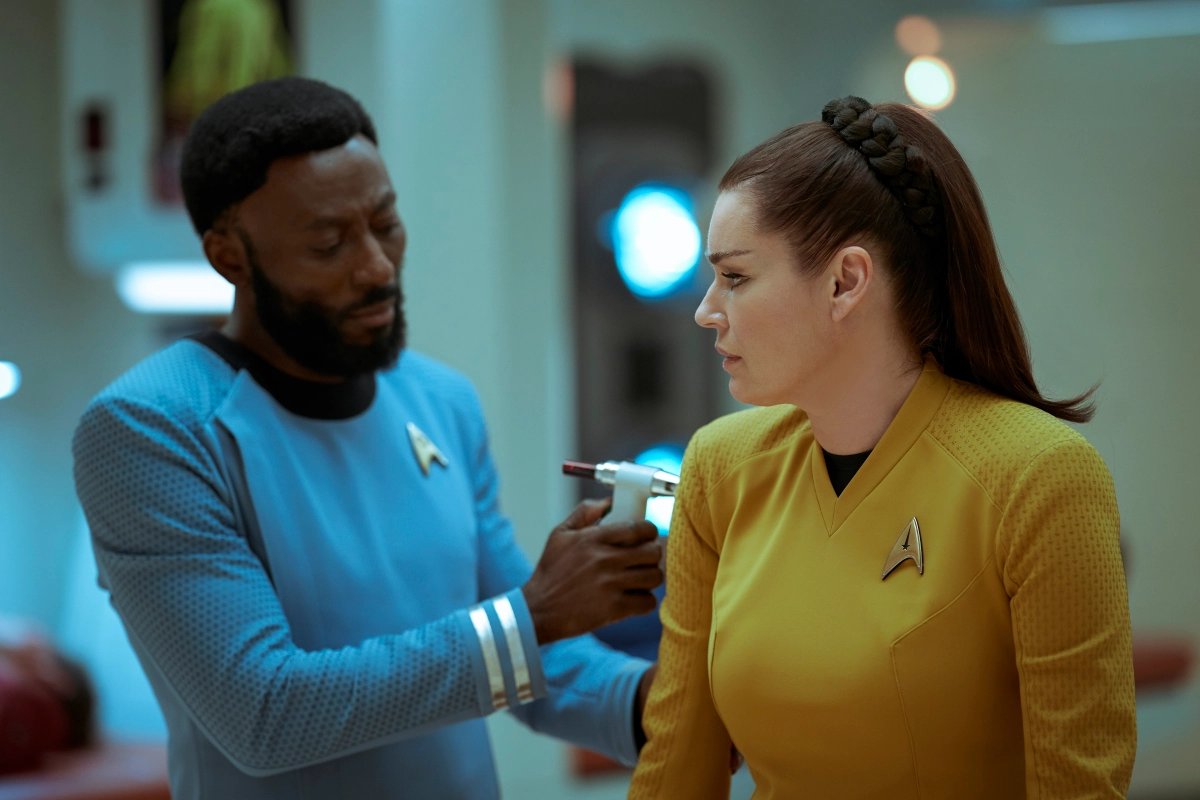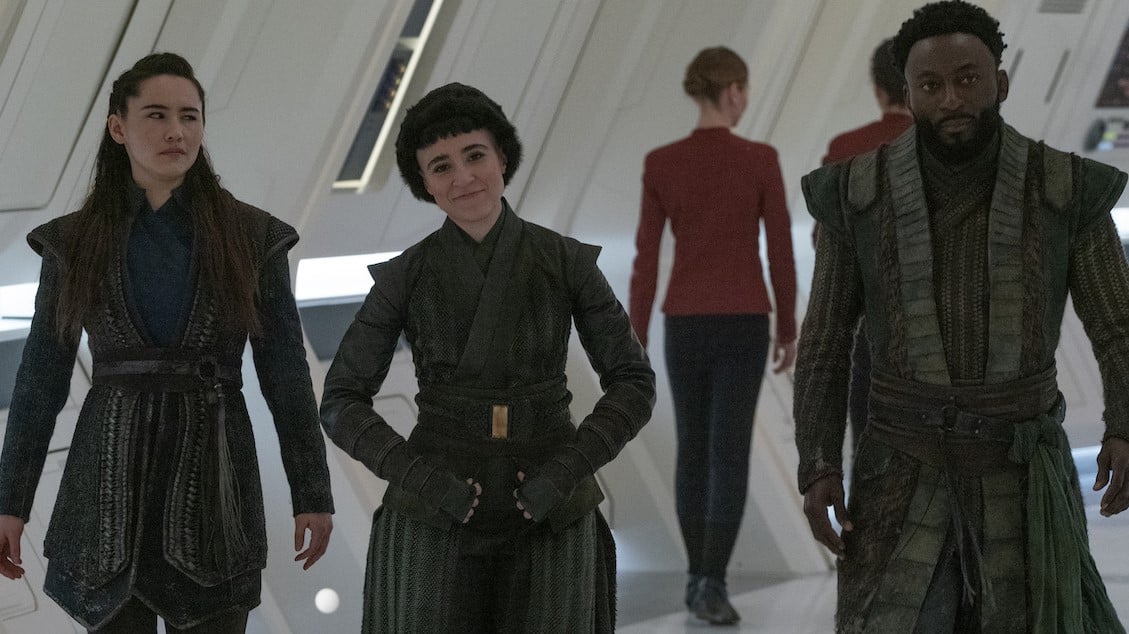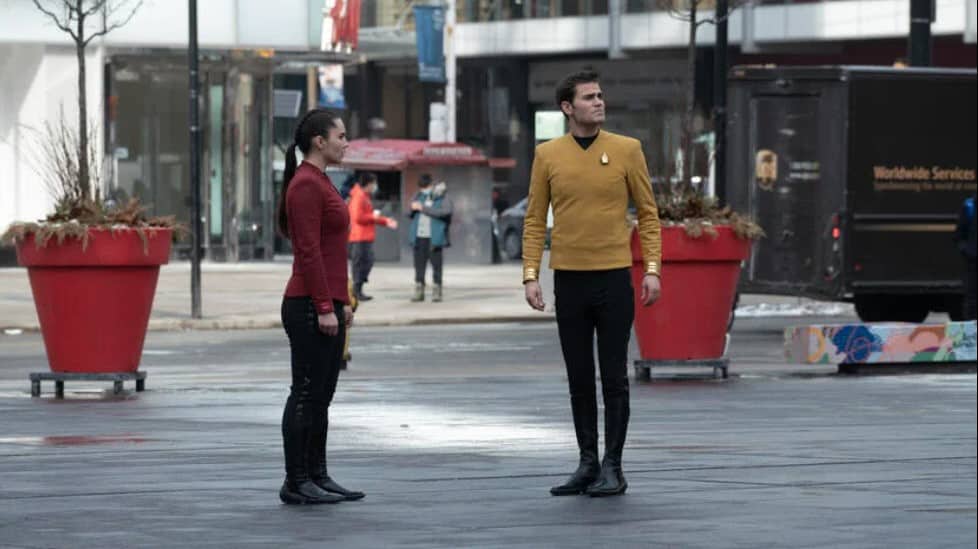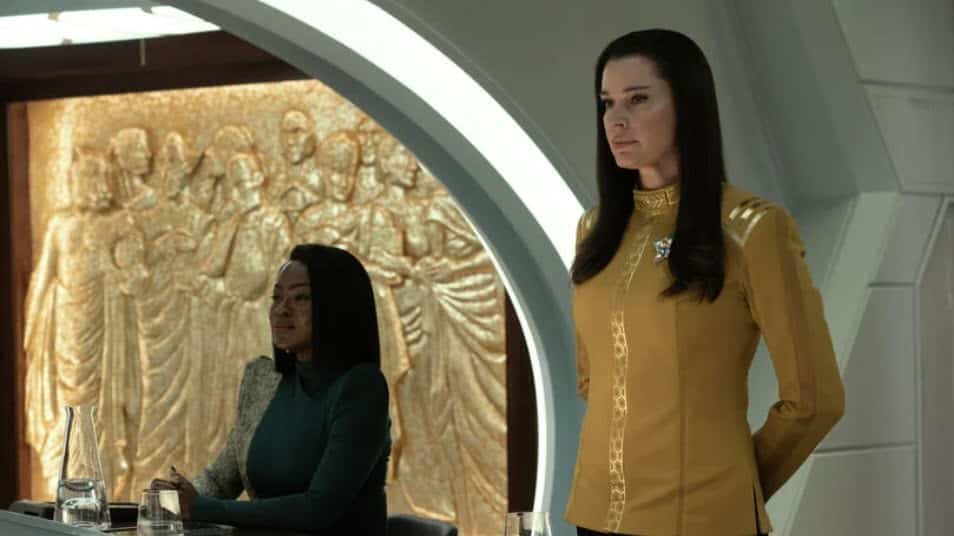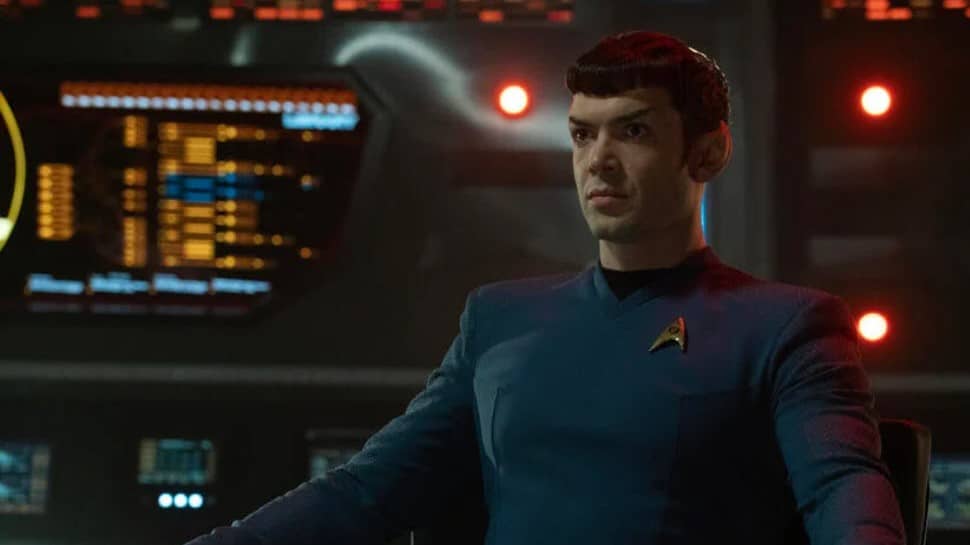Number One deals with an outbreak aboard the Enterprise while Pike and Spock are trapped on-world with the “Ghosts of Illyria.” Written by Akela Cooper & Bill Wolkoff, directed by Leslie Hope.
Mark Turetsky: This episode has it all! Contact tracing, lockdowns, people engaging in risky behavior in the face of a deadly infection. Sometimes it’s nice to just escape to the 23rd century, isn’t it, Will?
Will Nevin: Good ol’ fashioned escapism, Mark.
Number One Stunna
Mark: There was a common complaint a few years back when Pike, Spock and Number One appeared on Discovery: namely, while Spock and Pike got a ton of screentime (Pike as the ship’s captain and Spock as something of a plot MacGuffin), Number One didn’t have much to do, only appearing in three episodes.
It was kind of baffling, because they cast Rebecca Romijn, which seemed like something of a coup, and a waste of a talented performer in the role. It was also somewhat exacerbated by her absence from most of the premiere of this series. Here, Number One gets the spotlight, and I feel like the hands-off approach to the character previously was somewhat justified by the revelation we learned about her in this episode.

Will: This was an opportunity from the gods of canon: We have a character as old as the very franchise itself, but we don’t know anything about her aside from the fact that network executives weren’t comfortable with a woman that close to command. So what do the writers do here? They make her a product of genetic manipulation, tying her indirectly into the Eugenics War (they’ve got to be going somewhere with that) and giving her a direct and personal conflict with La’an.
Oh, and she’s also a strong-as-hell badass.
Mark: Just to put things into a canonical perspective: D.C. Fontana’s 1989 novel Vulcan’s Glory established her as an Illyrian. Now, the novels are, what the French call, “le not at all canon.” But, despite all the cries that the current brains-that-be at Star Trek don’t care about canon, it’s one of many instances where they’ve taken something from secondary canon (or in some cases even fanzine canon) and made it canon.
Here’s the problem, though: Star Trek: Enterprise established Illyrians as an alien race, and had them show up, like so many other Trek races, with a prosthetic forehead and everything. So, how do the Kings Solomon at Star Trek split this baby? They make the Illyrians masters of genetic manipulation. Not only that, as Number One establishes here, they specifically alter their genes in order to live in ecological harmony with their surroundings, so of course Number One would be altered to appear human if she’s joining Starfleet, right?
Will: I don’t know if I’d read that much into her admitted deception. You know how Leela happened to be the least mutant looking mutant in Futurama? I think Una came from an Illyrian settlement with inhabitants who happened to look a whole lot like humans. It’s super convenient for the plot, sure. But they handled this bit a whole lot better than explaining the differences between TOS and TNG/whenever else they appeared Klingons. That stuff was a needless detour into minutiae.
Also, if D.C. Fontana said it, it’s canon to me — no matter what those smelly French say.
Mark: It also squares the circle of her behavior in “The Cage.” At that point, they had Number One being the stoical, logical one, though didn’t establish she was an alien of any kind. When they made the second pilot, they gave that trait to Spock when they cut Number One out entirely. She looks and acts entirely human on Strange New Worlds, but there’s still that alien-seemingness to account for from “The Cage.” It’s not like everyone was crying out for this, and it wasn’t an obnoxious explanation (see above re Klingons). It’s just two and two put side by side for anyone to make four from if they want.
There Are Four Ligh–Actually Just Give Me All Of Them I Don’t Care How Many
Will: It also rationally explains her actions in this episode. If genetic manipulation is a grave sin in the Federation, of course she’d keep her reaction to the virus a secret. Although I believe this character — like Dr. M’Benga — would have come clean had she believed the crew to be in danger at that point. This, in short, is a more realistic version of Gene Roddenberry’s original vision: Yes, it’s the future, but people have problems. Society still has problems. But the crew of the Federation flagship don’t sleigh ride through space acting like a bunch of assholes. There’s an integrity and fundamental decency to everyone on board — even if they don’t always make the right decisions.

Mark: It’s a great hook. Because you know she’s a smart person. When you see her withhold what’s likely vital information from M’Benga early in the episode, you have to wonder if the virus is making her act irrationally, or if the writers have just completely lost the plot. And luckily, it’s neither. It’s this whole nother thing that gives nuance to a character who, prior to this, was just kind of there. And Romijn sells it.
Will: Outside of the overdone background acting and the “why the heck didn’t you already sedate these folks?”, I thought the virus plot played out well onboard. The general framework was nothing new — “Naked Time,” “Naked Now,” “Identity Crisis” and “Genesis” all come to mind as contagion-themed episodes and I didn’t even think about it that hard — but the idea that the virus spread via light was pretty cool. Also, the overacting might be one of the few moments that this show’s supersized budget may have failed it: On a smaller sickbay set, you don’t have room for all those patients.
Mark: Yeah, throughout the episode, I kept shouting “why are the lights still on?!” The characters established, onscreen, that they were going to turn the lights off, and yet sickbay, where the people sick with the light virus were being quarantined, had plenty of light. Yes, I get it’s a TV show, so something has to appear onscreen. Maybe if they put a red filter over everything and handwaved that the virus can’t travel over certain wavelengths of light it might have played better.
It’s also funny that you brought up the sedation, as La’an woke up from her sedation and attacked Nurse Chapel. You mentioned in our write-up of the pilot that they seemed to be nodding in the direction of an addiction storyline regarding La’an and sedatives, but it appears not to be that. Or who knows, maybe she’s developed a tolerance for sedatives from drug abuse.
Will: I feel that whatever the answer is, we’ll get more info on it this week with the Gorn and certainly her past trauma set for the spotlight. Are we sure she’s not at all an Augment? She was able to slug it out with Number One pretty good, and super strength might explain her tolerance for drugs and an unwillingness to take pain medication (lest it give away her high tolerance).
Mark: It’s also a nice contrast that everyone who knows about Una’s augment status is absolutely fine with it, except absolutely not La’an under any circumstances. It’s a realistic depiction of bigotry, because really that’s what this episode comes down to: it’s a Trek morality tale in the clothes of an alien virus story.
Will: You’re singing my song, Mark. Forgiveness. Bigotry. Sacrifice. All powerful themes in this episode. I hate to keep harping on Picard because for all of its faults, it got significantly better in the second season, but it took 10 episodes to make the sorts of points we’ve seen weekly with SNW. There’s no wasted space with this show.
Mark: And for all my joking about the use of COVID-19 terminology, it’s really just a matter of believability. For all of Trek’s stories about outbreaks of exotic viruses, this is the first time it’s done one for an audience that’s living through a global pandemic, so we know a little something about keeping a virus contained, even if we fail miserably at it much of the time.
Will: This felt all too real. All we needed was a few crewmembers pretending the virus wasn’t real, and it would have been like the last two years but with technobabble.
Riders In the Storm

Mark: Finally we have Pike and Spock stranded in an alien library. It’s like they’re in a video game: everyone on the planet is dead, but they’ve left behind detailed logs to read (or, if you’re like me, to skip over).
Will: You skip over the logs? The crucial, immersive world building that writers spend hours crafting? You monster. Savagery aside, I almost think this works as a proof of concept: Can an episode of SNW work without Pike? Yes, yes it can…so long as he makes an appearance or two.
Mark: So, I know there were no overt mentions of Pike’s impending doom this week, but I think there was a crucial moment in the opening scene. Una is about to go get Spock in order to return to the ship, and Pike sends her back, saying he’ll find Spock. I think what I’ve been theorizing about is happening. I think he purposely stays behind to protect Spock, because he knows he won’t die here.
Will: I’ll agree with that theory because 1) it’s solid and 2) I have no evidence with which to refute it. You’d think that if this behavior escalates a reasonable first officer would call the captain’s judgment into question, and we’ve already seen how Una is firmly in the “no fate but what we make” camp when it comes to spooky visions of the future. That could make for some good tension moving forward.
Mark: A different show (say, Battlestar Galactica) would have Una threaten Pike, and have Pike threaten to out her as an Illyrian, and they’d reach a form of détente, but I don’t think this is that kind of show.
Will: But back on the planet and back in this episode, we had another one of the classic Trek moments: Sometimes you have to trust the spooky space ghost and believe in the decency and worth of other alien species even if you don’t understand them or can’t relate to them in their physical form (or lack thereof).
Mark: Here, I think there’s the ghost of a previous draft. The explanation we’re given is that these Illyrians merged with the ion storm as the result of the virus, that their goal on this planet was to de-engineer themselves enough so that they could join the Federation. A much neater explanation for their merging with the ion storm would be that it was their intention (as Una says, the Illyrians alter themselves to better live in their ecosystems). I think that got changed in order to make their story reflect more on Una’s story, which is a totally valid direction to take it, but it feels unfinished somehow.
I think I would have much rather seen a story about that society who, in the face of bigotry, was trying to better assimilate and fit in with the Federation. It would be a more unsettling story, and maybe a more troubling story, and maybe that’s not the tone they wanted for this.
Will: It would also better explain the virus — if you let it run its course (assuming you don’t burn down your house or, I don’t know, beam part of a planetary core on to your starship) then you become a non-corporeal lifeform. I am absolutely satisfied with the story we got, but I think yours has merit — especially if we look at the Illyrians through the lens of colonization. The British/Americans/Starfleet have conquered — sometimes with force, sometimes with diplomacy, sometimes with culture, but conquered nevertheless. It’s interesting to see a race willing to do anything to achieve the opposite: total environmental assimilation. Although how Illyrians treat native populations remains, I suppose, an open question.
Mark: There’s definitely something to that. And also the idea that there are those who would be willing to erase their own culture in order to join The Federation. We hear so much about how the Vulcans cherish Infinite Diversity in Infinite Combinations, but what about when the Federation just outright shuns a certain species?
I just keep going back to Una’s log entry at the end of the episode.
What if I hadn’t saved all those lives? Would the captain feel the same? What would he do if I wasn’t a hero? One of the “good ones?” When will it be enough to just… be an Illyrian?
The use of the term “good ones” is incredibly loaded. The expectation of being a model minority, the terror of hiding in plain sight and being discovered. I hope they continue to treat this plotline with sensitivity. Star Trek, for all its good intentions, has taken some pretty bad missteps. But I’m hopeful, especially since this episode was written by an African American woman and a Jewish man.
Will: The path between patronizing and polarizing is a narrow one, but nothing from this show so far makes me doubt the creative direction it’s taking. Mark me down as hopeful as well.
Stray New Words
- Dr. M’Benga Scotty’d his daughter!
- I could theorize about all the different ways people have been kept in stasis on Star Trek, but I’ll just trust that Dr. M’Benga is smarter than I am, and that this is the only way.
- Uhura’s cadet quarters, with her private space essentially being a bunk with a curtain, calls to mind the low-rank quarters on Lower Decks, which are literally in a hallway. Still, the Enterprise is the flagship and the Cerritos is far from it.
- We probably shouldn’t try to explain why the sickbay and crew quarters on this NCC-1701 appear to be much larger than the ones on 1701-D.
- They don’t need all those spaces for families, Will.
- Told you we shouldn’t try, Mark.

